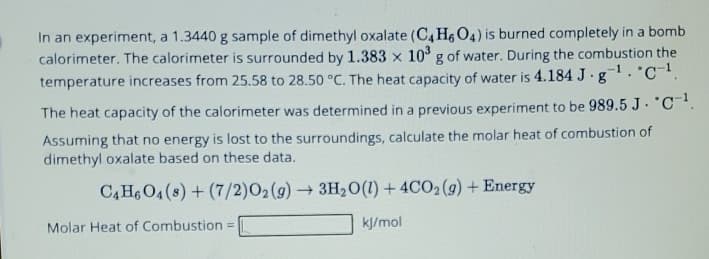In an experiment, a 1.3440 g sample of dimethyl oxalate (C4H6 O4) is burned completely in a bomb calorimeter. The calorimeter is surrounded by 1.383 x 103 g of water. During the combustion the temperature increases from 25.58 to 28.50 °C. The heat capacity of water is 4.184 J. g. C¹. The heat capacity of the calorimeter was determined in a previous experiment to be 989.5 J. "C¹. Assuming that no energy is lost to the surroundings, calculate the molar heat of combustion of dimethyl oxalate based on these data. C4H6O4(s)+(7/2)O2(g) → 3H2O(l) + 4CO2(g) +Energy Molar Heat of Combustion = kJ/mol
In an experiment, a 1.3440 g sample of dimethyl oxalate (C4H6 O4) is burned completely in a bomb calorimeter. The calorimeter is surrounded by 1.383 x 103 g of water. During the combustion the temperature increases from 25.58 to 28.50 °C. The heat capacity of water is 4.184 J. g. C¹. The heat capacity of the calorimeter was determined in a previous experiment to be 989.5 J. "C¹. Assuming that no energy is lost to the surroundings, calculate the molar heat of combustion of dimethyl oxalate based on these data. C4H6O4(s)+(7/2)O2(g) → 3H2O(l) + 4CO2(g) +Energy Molar Heat of Combustion = kJ/mol
Chemistry: An Atoms First Approach
2nd Edition
ISBN:9781305079243
Author:Steven S. Zumdahl, Susan A. Zumdahl
Publisher:Steven S. Zumdahl, Susan A. Zumdahl
Chapter7: Chemical Energy
Section: Chapter Questions
Problem 100AE
Related questions
Question

Transcribed Image Text:In an experiment, a 1.3440 g sample of dimethyl oxalate (C4H6 O4) is burned completely in a bomb
calorimeter. The calorimeter is surrounded by 1.383 x 103 g of water. During the combustion the
temperature increases from 25.58 to 28.50 °C. The heat capacity of water is 4.184 J. g. C¹.
The heat capacity of the calorimeter was determined in a previous experiment to be 989.5 J. "C¹.
Assuming that no energy is lost to the surroundings, calculate the molar heat of combustion of
dimethyl oxalate based on these data.
C4H6O4(s)+(7/2)O2(g) → 3H2O(l) + 4CO2(g) +Energy
Molar Heat of Combustion =
kJ/mol
AI-Generated Solution
Unlock instant AI solutions
Tap the button
to generate a solution
Recommended textbooks for you

Chemistry: An Atoms First Approach
Chemistry
ISBN:
9781305079243
Author:
Steven S. Zumdahl, Susan A. Zumdahl
Publisher:
Cengage Learning

Chemistry
Chemistry
ISBN:
9781305957404
Author:
Steven S. Zumdahl, Susan A. Zumdahl, Donald J. DeCoste
Publisher:
Cengage Learning


Chemistry: An Atoms First Approach
Chemistry
ISBN:
9781305079243
Author:
Steven S. Zumdahl, Susan A. Zumdahl
Publisher:
Cengage Learning

Chemistry
Chemistry
ISBN:
9781305957404
Author:
Steven S. Zumdahl, Susan A. Zumdahl, Donald J. DeCoste
Publisher:
Cengage Learning


General Chemistry - Standalone book (MindTap Cour…
Chemistry
ISBN:
9781305580343
Author:
Steven D. Gammon, Ebbing, Darrell Ebbing, Steven D., Darrell; Gammon, Darrell Ebbing; Steven D. Gammon, Darrell D.; Gammon, Ebbing; Steven D. Gammon; Darrell
Publisher:
Cengage Learning

Chemistry: Principles and Reactions
Chemistry
ISBN:
9781305079373
Author:
William L. Masterton, Cecile N. Hurley
Publisher:
Cengage Learning

Chemistry & Chemical Reactivity
Chemistry
ISBN:
9781133949640
Author:
John C. Kotz, Paul M. Treichel, John Townsend, David Treichel
Publisher:
Cengage Learning